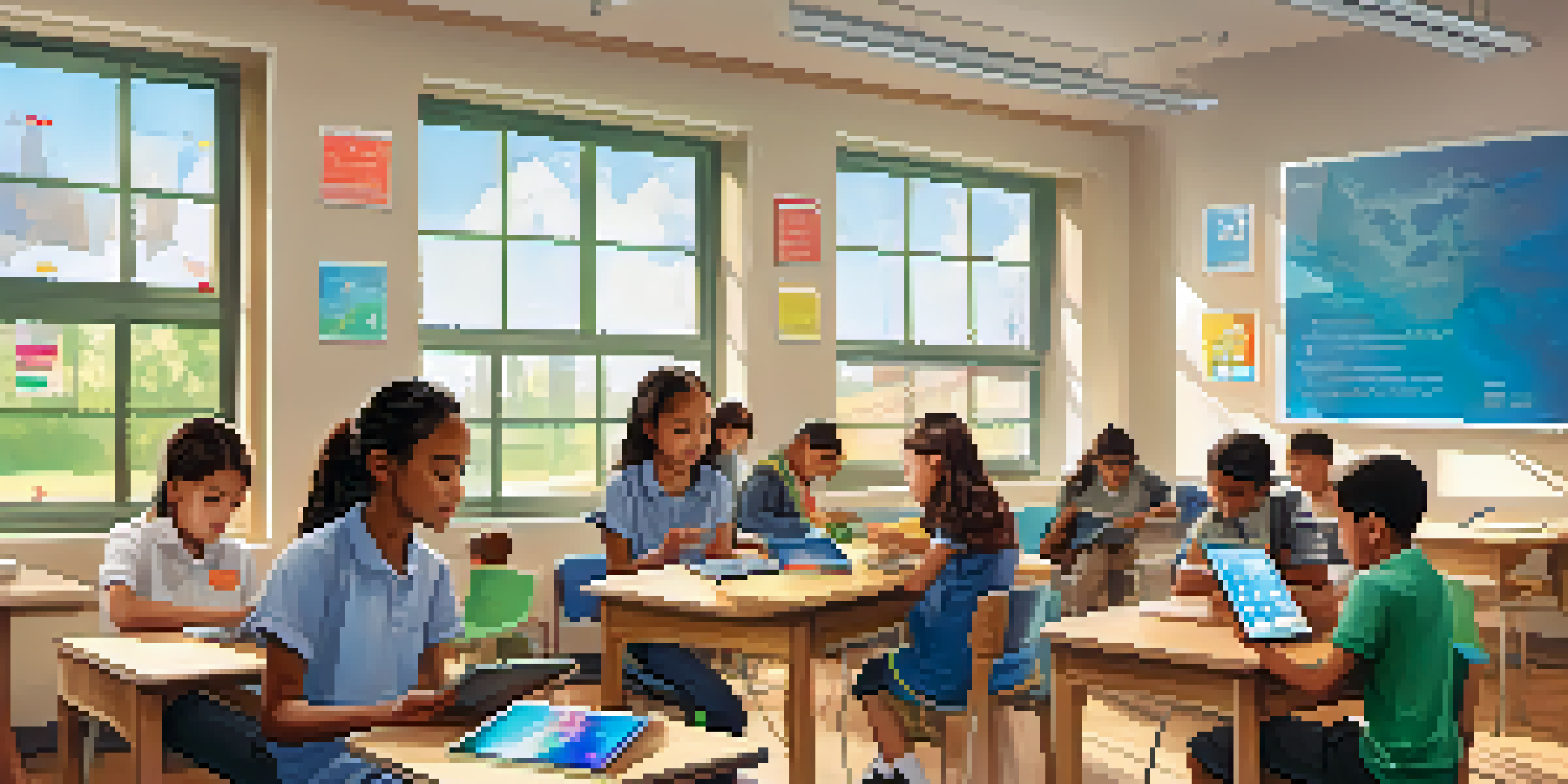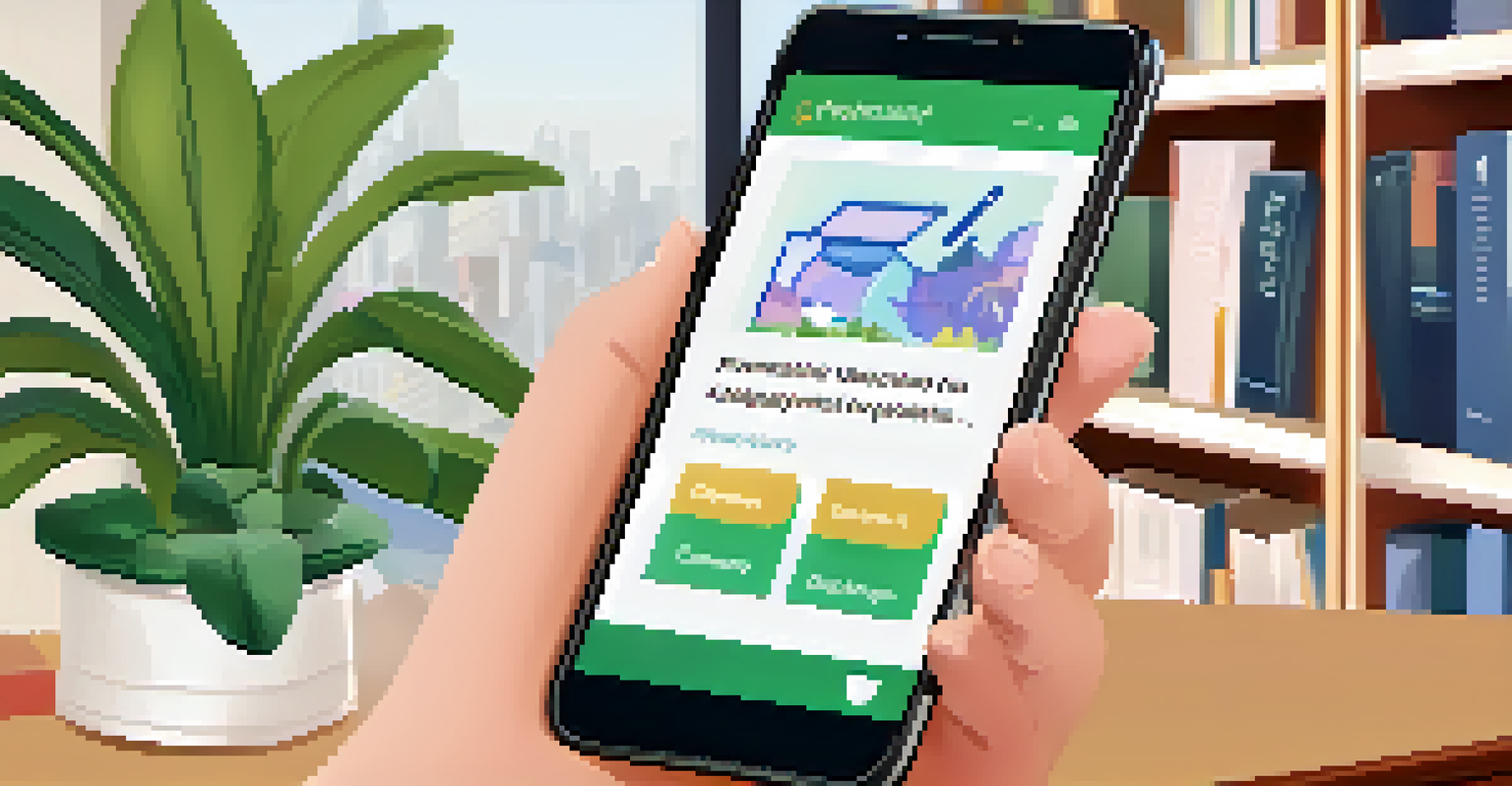Integrating Artificial Intelligence in Mobile Learning Solutions

Understanding Mobile Learning and Its Importance
Mobile learning, or m-learning, refers to the use of mobile devices to access educational content anytime and anywhere. This flexibility makes it a popular choice for learners who are constantly on the move. In today's fast-paced world, traditional learning methods may not suffice, as they often lack the adaptability that modern learners need.
The great growling engine of change - technology - is a continual challenge for educators, but it also presents unprecedented opportunities for innovation in learning.
Integrating mobile learning into educational frameworks opens up opportunities for personalized learning experiences. For instance, students can learn at their own pace, revisiting complex topics as needed. This approach not only improves retention but also caters to diverse learning styles, making education more inclusive.
Ultimately, the rise of mobile learning signifies a shift towards more accessible education. By leveraging technology, we can break down geographical barriers and provide learning opportunities to those who may not have had them otherwise. Now, let's explore how artificial intelligence can further enhance these solutions.
The Role of Artificial Intelligence in Education
Artificial intelligence (AI) refers to computer systems designed to mimic human intelligence and behavior. In education, AI can analyze data and make predictions about learner needs, paving the way for tailored educational experiences. This technology can identify learning patterns, helping educators understand where students struggle and excel.

For instance, AI-driven platforms can recommend resources or activities based on a student’s performance, ensuring that they receive the support they need. This personalized approach not only boosts engagement but also fosters a sense of achievement among learners. The more relevant the material is to a student’s individual goals, the more likely they are to stay motivated.
Mobile Learning Enhances Accessibility
Mobile learning allows students to access educational content anytime and anywhere, making education more flexible and inclusive.
Moreover, AI enhances administrative efficiency, allowing educators to focus more on teaching than on paperwork. Automating routine tasks frees up time for personalized interactions, which can significantly enrich the learning experience.
Creating Personalized Learning Paths with AI
One of the standout features of integrating AI into mobile learning is the ability to create personalized learning paths. By analyzing a learner's historical data, AI can recommend specific courses, resources, or even supplemental materials tailored to their needs. This customization ensures that learners engage with content that resonates with their interests and knowledge level.
Education is not the filling of a pail, but the lighting of a fire.
For example, an AI system might determine that a student struggles with algebra concepts but excels in geometry. As a result, the system can provide additional algebra resources while allowing the student to progress in geometry. This targeted approach not only improves comprehension but also builds confidence.
Personalized learning paths empower learners to take control of their educational journey. When students feel that their unique needs are recognized, they are more likely to stay engaged and motivated in their studies.
Enhancing Engagement Through AI-Powered Gamification
Gamification is a powerful tool in education that uses game-like elements to enhance engagement. When combined with AI, it takes on a new dimension, making learning not just informative but also fun. For instance, AI can analyze a learner's interaction with gamified elements and adjust the difficulty level in real-time, ensuring that challenges are always appropriate.
Consider a mobile learning app that uses AI to create quizzes and challenges tailored to a student’s progress. If a learner answers questions correctly, the app can increase the difficulty, keeping them engaged. Conversely, if they struggle, the AI can offer hints or simpler questions to help them build confidence.
AI Personalizes Learning Experiences
Artificial intelligence analyzes learner data to create tailored educational experiences, boosting engagement and motivation.
By incorporating gamification, educators can transform the mobile learning experience into an interactive adventure. This approach not only enhances knowledge retention but also fosters a sense of community among learners who engage in friendly competition.
Utilizing AI for Real-Time Feedback and Assessment
Feedback is crucial for learning, and AI can provide real-time assessments that help learners adjust their strategies. Traditional assessments often come too late, missing the opportunity for immediate correction and guidance. AI-powered tools can offer instant insights, allowing students to understand their performance and areas for improvement right away.
Imagine a mobile app that analyzes a student's answers as they complete exercises. The app could highlight misconceptions immediately, providing explanations or resources to clarify misunderstandings. This immediate feedback loop helps learners adjust their approach, fostering a growth mindset.
Furthermore, real-time assessments can help educators refine their teaching methods. With data on student performance, teachers can identify trends and adjust their lesson plans accordingly to better meet the needs of their students.
Leveraging Data Analytics for Continuous Improvement
Data analytics is another powerful aspect of AI that can significantly enhance mobile learning. By collecting and analyzing data on learner interactions, educators can gain valuable insights into the effectiveness of their teaching strategies. This data-driven approach enables continuous improvement in both content and delivery.
For instance, if data reveals that a particular module has a high dropout rate, educators can investigate the reasons behind it. Maybe the content is too challenging or not engaging enough. With this information, they can make informed adjustments to enhance the learning experience.
Data Analytics Drives Continuous Improvement
Leveraging data analytics helps educators refine teaching strategies and content based on learner interactions and performance.
In essence, leveraging data analytics allows educators to be proactive rather than reactive. By understanding student behavior and preferences, they can create a more effective and enjoyable learning environment.
Addressing Challenges in AI Implementation in Education
While the benefits of AI in mobile learning are clear, there are challenges to consider as well. Implementing AI solutions requires significant investment in technology and training for educators. Additionally, there may be resistance to change from both teachers and students who are accustomed to traditional learning methods.
Privacy and data security are also critical concerns. As AI systems collect vast amounts of data about learners, protecting that information becomes paramount. Educators and institutions need to ensure that they comply with regulations and maintain transparency with students regarding data usage.

Despite these challenges, the potential of AI to enhance mobile learning is undeniable. By addressing these issues head-on, educational institutions can pave the way for a more effective and engaging learning experience.
The Future of AI in Mobile Learning Solutions
Looking ahead, the future of AI in mobile learning is promising. As technology continues to evolve, we can expect even more sophisticated AI tools that can adapt to individual learning styles and preferences. The integration of virtual and augmented reality with AI could also create immersive learning experiences that were previously unimaginable.
Moreover, as institutions become more familiar with AI, we may see a broader acceptance of these technologies in traditional educational settings. This evolution could lead to a more blended approach to learning, where mobile solutions complement classroom instruction.
Ultimately, the successful integration of AI in mobile learning solutions will depend on collaboration between educators, technologists, and policymakers. By working together, we can harness the power of AI to create a more engaging, effective, and personalized learning experience for everyone.